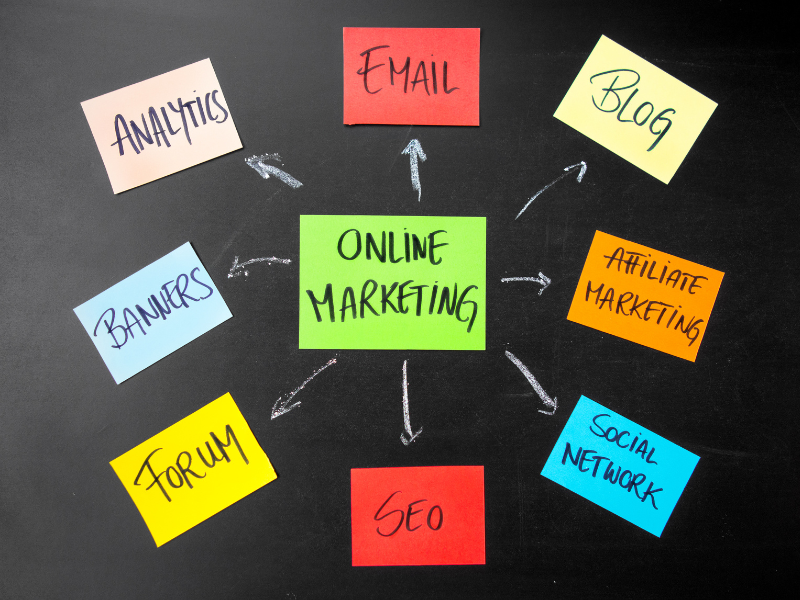
The Internet is a volatile place, with new platforms launching more frequently than most of us do laundry and a constant shifting in the ways that users use the Web. Small business marketers are playing a constant game of catch-up as the online world marches steadily onward. It’s a game that can be very easy to lose when you don’t have a full-time marketing staff to keep tabs on things 24/7.
Think your online marketing strategy might be living in the past? Not even sure what an up-to-date online marketing strategy looks like?
These four signs indicate that it might be time to stir things up a bit and trade those proverbial bell bottoms for app development, Pinterest and Vine.
Your Online Marketing Strategy Might Need an Update If:
You’re Using Somebody Else’s Platform Exclusively
Now, I’m not saying that uploading photos to Facebook is a bad thing. But using big, corporate-owned platforms and not hosting any of your own content on your own website, for example – not such a great idea.
There are two big reasons for this:
- One is the phenomenon of digital sharecropping, in which sites like Instagram and Facebook wind up owning your content and potentially profiting from it.
- Second is that in this day and age, you’re just not going to look like a legitimate business without your own website full of relevant and interesting content.
Not sure how to get started? It might be time to hire a web designer to get you set up.

You’re Four Social Networks Behind
Does MySpace ring a bell? Xanga? LiveJournal? These early social networking sites all had their day, to be sure, but that day is long gone. In fact, many of them are totally shifting gears to appeal to different audiences, or simply aren’t used or functional in any useful capacity anymore.
I know it can be tough for small businesses to keep up with every single new social network, and it’s not always worth it to be an early adopter when you don’t know what’s going to fly – but it is important to find the networks that are thriving and right for your business.
You’re Ignoring ROI (Return on Investment) and Analytics
This more technical side of online marketing can be intimidating and just a little bit bewildering. You’re already running a marketing campaign – now you need to analyze it, too.
True, it takes a little bit more work, but tracking data can go a long way in ensuring that the effort you put into marketing is well-placed. And the good news is, you don’t need to be a math or programming whiz to measure the success of your online marketing strategy.

You’re Trying to Appeal to Everyone
The days when you could churn out content and try to reach everyone with it are over. Now, market segmentation is a necessity. There’s simply so much of the Web to reach that you need to strategize and produce content accordingly.
Even more, you need to post that segmented content in the right places. What you post on Pinterest, for example, is going to be very different from what you post on LinkedIn.
The Magic Word is Strategy
The key to online marketing success is right there in the title of this post: Strategy. The biggest sign that your online marketing strategy is outdated might be the fact that you have no strategy.
If this is the case, it’s time to put your nose to the grindstone, figure out your audience, create an editorial calendar and start writing content that adds up to a greater whole.
And of course, don’t forget to measure the results of your online marketing strategy.

Navigating the Ever-Changing Seas of Online Marketing
The fast-paced evolution of the internet demands that small business marketers stay nimble and adaptable to keep up with the latest trends and shifts. Stagnating in the past can be detrimental to your online marketing strategy, and these telltale signs might be indicators that it’s time for a refreshing update:
- You’re Using Someone Else’s Platform Exclusively:
- Relying solely on corporate-owned platforms diminishes control over your content.
- Ownership and legitimacy are compromised when you lack your own website.
- Leverage the power of owning your digital space to establish credibility.
- A well-designed website showcases your brand identity and encourages engagement.
- Invest in web design services to create an online hub that reflects your business.
- You’re Lagging Behind on Social Networks:
- Past social networking giants like MySpace are long gone, making adaptation crucial.
- Identify thriving networks relevant to your business and target audience.
- Prioritize engagement on networks that align with your brand values.
- Stay informed about emerging platforms that resonate with your audience.
- Evaluate the demographics, user behavior, and content preferences of each network.
- ROI and Analytics Take a Backseat:
- Ignoring return on investment (ROI) and analytics leaves your efforts unchecked.
- Tracking data is essential to ensure your marketing endeavors are effective.
- Utilize user-friendly analytics tools tailored for small businesses.
- Analyze website traffic, social media engagement, and conversion rates.
- Gather insights to refine your strategy, allocate resources wisely, and optimize campaigns.
- You’re Casting a Wide Net:
- Trying to appeal to everyone is an outdated approach.
- Effective market segmentation is essential in the expansive online landscape.
- Define specific buyer personas to target distinct audience segments.
- Tailor your messaging, content, and offers to cater to each persona’s needs.
- Personalize email campaigns and social media content to maximize relevance.
| Aspects of Online Marketing | Key Points |
|---|---|
| Using Someone Else’s Platform | – Relying solely on external platforms limits control over content. – Ownership and legitimacy are compromised without your own website. – Invest in web design services for credibility. |
| Lagging Behind on Social Networks | – Adaptation is crucial as past social networks fade. – Identify thriving networks relevant to your business. – Prioritize engagement on aligned platforms. – Stay informed about emerging platforms. |
| ROI and Analytics Take a Backseat | – Ignoring ROI and analytics hampers effective marketing. – Use user-friendly analytics tools tailored for small businesses. – Analyze website traffic, social engagement, and conversion rates. – Gather insights to optimize campaigns. |
| Casting a Wide Net | – Appealing to everyone is outdated. – Market segmentation is essential for tailored engagement. – Define buyer personas for distinct audience segments. – Customize messaging and content for relevance. |
| Embracing Strategy for Online Success | – Strategy is the cornerstone of effective online marketing. – Define target audience and create an editorial calendar. – Tailor content for platforms and analyze results. – Regularly update your strategy for sustained growth. |
| Was this response better or worse? | |
| Better | |
| Worse | |
| Same | |

Embracing Strategy for Online Marketing Triumph
The cardinal rule for online marketing triumph is to wield a strategy. If your marketing efforts seem scattered or lack coherence, it’s high time to draft a comprehensive strategy:
- Define your target audience with precision.
- Develop a strategic editorial calendar for consistent content creation.
- Craft tailored content for each platform, understanding the unique needs of your audience.
- Monitor and measure the results of your online marketing initiatives.
- Regularly update your strategy to align with evolving industry trends and customer preferences.
Remember, an updated online marketing strategy is your compass, ensuring that you stay relevant and impactful in the ever-evolving digital landscape. Adapting to change is not just a survival strategy; it’s a thriving strategy that positions your small business for success.
Frequently Asked Questions
Why is keeping up with the ever-changing online landscape important for small business marketers?
The internet evolves rapidly, introducing new platforms and user behaviors frequently. Stagnating in outdated approaches can hinder your online marketing success. Adapting to trends and shifts is essential to maintain relevance and effectively engage your target audience.
What are the signs that my online marketing strategy needs an update?
There are four key indicators:
- Exclusively Using Someone Else’s Platform: Relying solely on external platforms without hosting content on your website compromises control and legitimacy.
- Lagging Behind on Social Networks: Ignoring emerging and thriving networks limits your online reach.
- Ignoring ROI and Analytics: Neglecting data analysis prevents you from optimizing marketing efforts.
- Casting a Wide Net: Attempting to reach everyone rather than segmented audiences is outdated.
Why is owning your digital space crucial for credibility?
Relying solely on third-party platforms exposes you to digital sharecropping, where your content is controlled by others. Owning your website establishes legitimacy and provides a hub for relevant and engaging content that aligns with your brand.
How can I catch up on social networks without overwhelming my resources?
Prioritize networks that align with your target audience and brand values. Stay informed about emerging platforms. Adapting to relevant networks ensures effective engagement and prevents wasting resources on outdated platforms.
How can ROI and analytics impact my online marketing strategy?
Tracking data is essential for assessing the effectiveness of your efforts. User-friendly analytics tools can provide insights into website traffic, social media engagement, and conversion rates. Utilize these insights to allocate resources wisely and refine your strategy for optimal results.
What is the importance of market segmentation in modern online marketing?
The vastness of the internet demands focused efforts. Market segmentation involves defining distinct buyer personas and tailoring content and messaging to their needs. Personalizing your approach enhances relevance and engagement.
How can I develop an effective online marketing strategy?
Crafting a strategy involves:
- Defining Your Target Audience: Precisely identify your ideal customers.
- Creating an Editorial Calendar: Plan consistent content creation.
- Tailoring Content for Platforms: Customize content for different networks.
- Monitoring and Measuring Results: Analyze data to refine your approach.
- Regular Strategy Updates: Stay aligned with evolving trends and preferences.
How does an updated online marketing strategy benefit my business?
An updated strategy ensures relevance in the ever-changing digital landscape. Adapting to current trends enhances engagement and positions your business for success. It’s not just a survival strategy; it’s a thriving approach that maximizes your online impact.
What’s the key takeaway for online marketing success?
Strategy is the linchpin. An effective online marketing strategy allows you to navigate the dynamic online landscape with precision, relevance, and impact. Embrace change and adapt your strategy for sustained growth.
Where can I find assistance in modernizing my online marketing strategy?
Consider seeking guidance from digital marketing experts, web designers, or agencies that specialize in small business marketing. These professionals can help you create and implement an up-to-date strategy tailored to your business goals.
Up-to-Date Strategy Photo via Shutterstock
This article, “Is Your Online Marketing Strategy Up to Date?” was first published on Small Business Trends